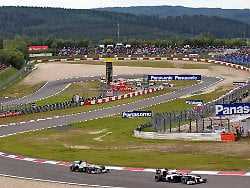Germany is left out
A hopeless fight for a Formula 1 race
2/8/2022 5:03 p.m
Germany is the land of car manufacturers and has been an integral part of the Formula 1 racing calendar for many years. With the realignment of the racing series and the arrival of wealthy countries, the racing series disappeared from the traditional circuits. A return is hard to imagine. An inventory.
The thing with the car manufacturer nation Germany and Formula 1 is now such a thing. When the racing calendar was in dire straits, the Nürburgring stepped in at short notice. It was a surprising comeback, after the premier motorsport class had last competed in the Eifel in 2013. The Hockenheimring was considered a reliable partner for decades anyway. In 2019, however, the last Grand Prix to date was held on the course in North Baden. 23 races are planned in the calendar for 2022, but Germany is not there even in the record year. The prospect of a return afterwards is also not exactly in the best of shape.
As long as there are many countries that are willing “to pay sums for a Formula 1 race that cannot be refinanced at all, it will be difficult to play in this concert,” says Jorn Teske, one of two managing directors of the Hockenheimring GmbH. It’s not that one or let alone all sides doesn’t want to, it’s about ability, about being able to afford it. It’s about keeping up with countries where the fees sometimes come from state funds or from private investors.
Entry fees too high
“The fact that the Hockenheimring has an interest in Formula 1 taking place here is nothing new,” says Teske. “We would be happy to welcome Formula 1 to the Nürburgring,” emphasizes Nürburgring spokesman Alexander Gerhard. “We also all know the hurdles that exist for this,” said Teske. But: “The financial hurdle with the entrance fee is between us.” It has to be economically viable, Gerhard puts it. Those responsible for both routes follow the same course, there is agreement. An alternating solution, as has already been the case at Nürburg and in Hockenheim, is also very conceivable. “For me, that’s not even a compromise, it’s actually an ideal solution. I would strive for that,” says Teske.
Economically viable means for both German racetracks, which according to their own statements cannot complain about a lack of capacity utilization even without Formula 1, that they do not want to take the risk of losing millions. Furthermore, the circuits can only cover expenses with income from ticket sales, a holdover from the days of Bernie Ecclestone. “It’s a way for Formula 1 to weigh up how important the market is to them,” emphasized Teske, with a view to Germany as the host. “It is clear that the whole thing cannot be carried out on the back of the racetracks. We do not have the strength to do so, it is not our job either.”
Is the country of car manufacturers no longer interested?
It needs sponsors. Nothing has changed after a video call last month between those responsible for the Hockenheim and Nürburgring and representatives of Formula 1. Formula 1 boss Stefano Domenicali recently said in an interview with the “Redaktionsnetzwerk Deutschland” that he wanted to try to shake up the German market. The Italian, once a team boss at Ferrari and therefore very familiar with the German racetracks, complains of a lack of interest from and in Germany.
At the same time, the managing director of the racing series also spoke about other future candidates, such as further races in China, now that Guanyu Zhou at Alfa Romeo has the first regular driver from the controversial realm of the current Olympic host. “A comeback in Africa – no matter whether in the north or south – would be great,” Domenicali also emphasized. And starting next year, Qatar will also be one of the hosts for an initial ten years, with the rich emirate standing in for Australia last season. That with the car-maker nation of Germany and Formula 1 could remain a thing.
